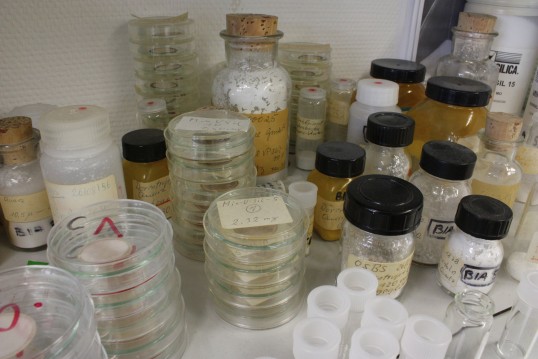Biological hazards

Source: © IFA
Biolgogical hazards – i.e. all hazards caused by plants, animals or microorganisms – accompany the activities of employees at many companies. European and German occupational safety and health (OSH) legislation in the form of Directive 2000/54/EC and the German Ordinance on Biological Substances (BioStoffV) deal with biological hazards caused in the workplace by so-called "biological agents". The most significant biological hazards in the field of OSH are microorganisms and viruses.
Biological agents include both natural and genetically modified bacteria, moulds and fungi, viruses, cell cultures and endoparasites which may infect or have a sensitizing or toxic effect on humans. Agents such as the infectious agent in BSE also belong to this group. Biological agents are divided into four risk groups (RGs) on the basis of their risk of infection (1 = low, 4 = high).
In addition to the manufacture and use thereof, activities involving biological agents also include any occupational contact with humans, animals, plants, biological products, objects and materials which may see biological agents released and employees exposed to them as a result.
Examples of fields in which activities of this type are carried out in either a commercial or public-sector context include biotechnology, healthcare, waste disposal, construction, university education, laboratory-based work and agriculture.
Activities involving biological agents can lead to accidents, occupational diseases and work-related health hazards. The German social accident insurance institutions have a statutory mandate to use all appropriate resources to ensure that such accidents and the development of occupational diseases and work-related health hazards are prevented. The German Social Accident Insurance (DGUV) and its members (German social accident insurance institutions serving trade and industry and the public sector) fulfil this mandate by implementing a wide variety of measures. To guard against hazards involving biological agents they provide information through various channels and offer consulting services within the framework of the supervisory duties they are required to deliver under the terms of the German Social Code. Working in specialist divisions and national-level committees, their experts draw up practice-oriented regulations for all sectors.
- Hazards caused by parts of plants or animals or animal bites do not fall within the scope of BioStoffV, and are instead to be assessed within the framework of the general requirements set out in the risk assessment section of the German Occupational Safety and Health Act (ArbSchG).
Information on biological hazards in the workplace
In the case of activities involving biological agents, employers are obliged to identify and assess related hazards and define required protective measures. This necessitates comprehensive information on biological agents. The DGUV therefore offers companies a range of information and guidelines which enable them to correctly comply with the requirements set out in BioStoffV. Employers are also referred to information made available through government departments.
